FIND QUOTIENT AND REMAINDER USING SYNTHETIC DIVISION
Subscribe to our ▶️ YouTube channel 🔴 for the latest videos, updates, and tips.
Find the quotient and remainder for the following using synthetic division:
Question 1 :
(x3 + x2 - 7x - 3) ÷ (x - 3)
Solution :
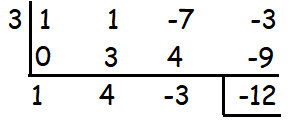
Quotient = x2 + 4x - 3
Remainder = -12
Question 2 :
(x3 + 2x2 - x - 4) ÷ (x + 2)
Solution :
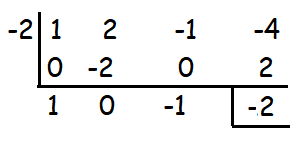
Quotient = x2 + 0x - 1
Remainder = -2
Question 3 :
(3x3 - 2x2 + 7x - 5) ÷ (x + 3)
Solution :
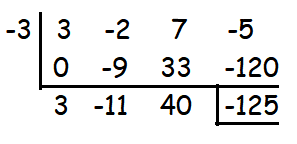
Quotient = 3x2 - 11x + 40
Remainder = -125
Question 4 :
(8x4 - 2x2 + 6x + 5) ÷ (4x + 1)
Solution :
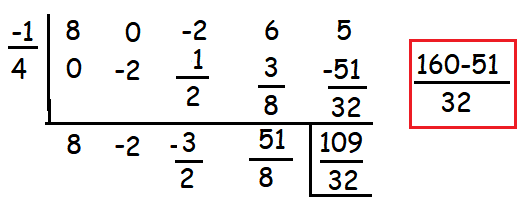
Quotient : 8x3 - 2x2 -(3x/2) + (51/8)
Remainder : 109/32
Question 5 :
If the quotient obtained on dividing (8x4 - 2x2 + 6x - 7) by (2x + 1) is (4x3 + px2 - qx + 3) then find p, q and also the remainder.
Solution :
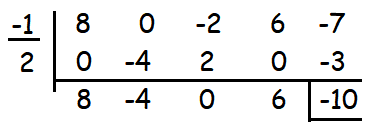
8x3 - 4x2 + 0x + 6
Dividing the quotient by 2, we get
4x3 - 2x2 + 0x + 3
The value of p and q are -2 and 0 respectively and remainder is -10.
Question 6 :
If the quotient obtained on dividing 3x3 + 11x2 + 34x + 106 by x - 3 is 3x2 + ax + b, then find a, b and also the remainder.
Solution :
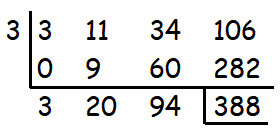
Quotient = 3x2 + 20x + 94
Given quotient = 3x2 + ax + b
By comparing the corresponding terms, we get
3x2 + 20x + 94 = 3x2 + ax + b
a = 20 and b = 94.
So, the values of a and b are 20 and 94 respectively.
Question 7 :
If f(x) = 3x3 + 4x2 - 5x + 7, find f(-4) using
a) Synthetic division
b) The remainder theorem.
Solution :
f(x) = 3x3 + 4x2 - 5x + 7
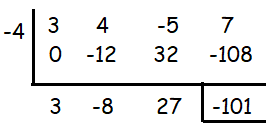
Using synthetic division shown above,
Quotient = 3x2 - 8x + 27
Remainder = -101
b) Using remainder theorem,
To find the value of f(-4), weh ave to apply -4 in place of x.
f(-4) = 3(-4)3 + 4(-4)2 - 5(-4) + 7
= 3(-64) + 4(16) + 20 + 7
= -192 + 64 + 27
= -192 + 91
= -101
Remainder = -101
In both ways we must get the same result.
Question 8 :
Solve the equation 2x3 - 3x2 - 11x + 6 = 0 given that -2 is a zero of f(x) = 2x3 - 3x2 - 11x + 6
Solution :
Given that -2 is a zero of the polynomial f(x) = 2x3 - 3x2 - 11x + 6
Then, applying x = -2 we get 0 as remainder.
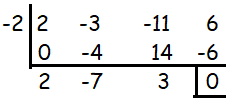
From the above steps, it is clear that -2 is one of the zeroes, to find the other zeroes we have to equate the quotient to 0.
2x2 - 7x + 3 = 0
2x2 - 6x - 1x + 3 = 0
2x(x - 3) - 1(x - 3) = 0
(2x - 1)(x - 3) = 0
Eqauting each factor to 0, we get
2x - 1 = 0 and x - 3 = 0
2x = 1 and x = 3
x = 1/2
So, the solutions are -2, 1/2 and 3.
Question 9 :
Use synthetic division to divide f(x) = x3 - 4x2 + x + 6 by x + 1. Use the result to find all zeroes of f.
Solution :
Given that,
f(x) = x3 - 4x2 + x + 6
We have to divide this polynomial by x + 1, to use synthetic division we solve for x by x + 1 = 0
x = -1
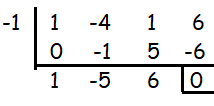
By dividing the given polynomial by x + 1, we get the remainder as 0. So, -1 is one of the zeroes of the polynomial.
Quotient = x2 - 5x + 6
To solve this, we will equate this to 0.
x2 - 5x + 6 = 0
x2 - 2x - 3x + 6 = 0
x(x - 2) - 3(x - 2) = 0
(x - 3)(x - 2) = 0
x - 3 and x - 2 = 0
x = 3 and x = 2
So, the solutions are -1, 2 and 3.
Question 10 :
Solve the equation 2x3 - 5x2 + x + 2 given that 2 is a zero of f(x) = 2x3 - 5x2 + x + 2.
Solution :
Given that,
f(x) = 2x3 - 5x2 + x + 2
Since 2 is a zero of the polynomial, by dividing this polynomial by x - 2, we get 0 as remainder.
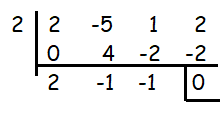
Quotient = 2x2 - 1x - 1
Remainder = 0
From this 2 is one of the zeroes of the polnomial, to get the other zeroes, we equate the quadratic to 0.
2x2 - 1x - 1 = 0
2x2 - 2x + 1x - 1 = 0
2x(x - 1) + 1(x - 1) = 0
(2x + 1)(x - 1) = 0
2x + 1 = 0 and x - 1 = 0
2x = -1 and x = 1
x = -1/2 and x = 1
So, the required zeroes are -1/2, 1 and 2.
Subscribe to our ▶️ YouTube channel 🔴 for the latest videos, updates, and tips.
Kindly mail your feedback to v4formath@gmail.com
We always appreciate your feedback.
About Us | Contact Us | Privacy Policy
©All rights reserved. onlinemath4all.com

Recent Articles
-
Mastering the SAT Math
Feb 11, 26 06:19 AM
Mastering the SAT Math -
Simplifying Square Roots Worksheet
Feb 10, 26 07:29 AM
Simplifying Square Roots Worksheet -
Simplifying Square Roots
Feb 10, 26 07:26 AM
Simplifying Square Roots - Concept - Solved Questions

